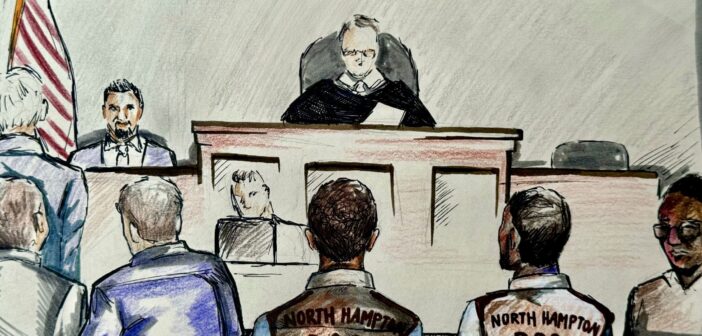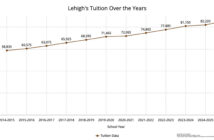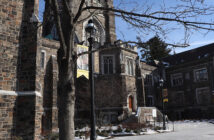More than 20 Lehigh students attended the preliminary hearing of former students Evans Oppong, Henry Dabuo and Otis Opoku on Tuesday, who are currently being held at Northampton County Prison under charges of forgery and theft of services.
LUPD arrested four international students from Ghana — Opoku, Oppong, Dabuo and Cyrilstan Nomobon Sowah-Nai — on Sept. 9 for allegedly falsifying their transcripts to gain admission to the university.
The preliminary hearing for Nomobon Sowah-Nai is scheduled for Oct. 15 at 10 a.m.
The cases of the Commonwealth of Pennsylvania v. Opoku, Oppong and Dabuo presented Dan Warner, vice provost of admissions and financial aid, as a witness on behalf of the Lehigh Admissions Office.
The three former students were seated next to their defense attorney, Evan Hughes, who was accompanied by counselor Jose Campos.
On the stand, Warner said he, Sarah Bombard, ‘06, ‘08G, the senior associate director of financial aid, and colleagues were reviewing and entering statistics for admissions when Jude Dabuo’s application was flagged because he’s “significantly older.”
Warner said he then discovered Jude’s brother, Henry Dabuo, was already enrolled at Lehigh and identified similar markings on their transcripts. He also said he noticed Opoku, Oppong and Henry Dabuo referenced one another as associates in their applications.
Warner said all of the transcripts were the same formatically, but there were identical blemishes.
Warner said the signature on the crossed line was “off” by four points, there was a misalignment of the grading system, and the spacing of the header “class assessment” was concerning.
When presented with Henry Dabuo’s transcript, the attorney asked Warner what steps were taken to verify the validity of the transcripts.
Warner said schools generally use their institutional domains for email communications, and since the email address provided on the transcripts was a Gmail address, he expressed concerns about verifying the authenticity of the transcripts.
He said the Admissions Office received help from an Education USA representative, who connected Lehigh with the headmaster of Opoku Ware School in Kumasi, Ghana, who then provided official transcripts to Warner and his colleagues.
The headmaster also confirmed Henry Dabuo’s transcript contained a “handful” of A’s, B’s, C’s, D’s and E’s — a pass, no-credit grade in Ghana. Warner said the grades were much weaker on their official transcripts than on the ones sent to Lehigh when the students applied.
Warner said the formatting of the grading scale looked “off,” and a grade school wouldn’t have “let this slide” because it would poorly represent them.
The Ghana to U.S. grade school conversion scale can be found here.
When Warner referenced the grade school transcripts, Hughes objected, citing hearsay because high school transcripts are private and require authentication. Hughes said without a custodian present to verify their validity, there was insufficient evidence.
Hughes said the role of a custodian of an institution is to attach certification for the country, seal the certification and send it to the respective university.
“(The) final results are provisional, Hughes said, “No one (is) here to explain how records are kept, pre- or post-translation because (these) records are not authenticated.”
Once Lehigh determined the transcripts were likely altered, Warner said the Admissions Office rescinded the admittance of the three students.
Warner was then questioned about the students’ financial aid packages, and he said they all received substantial cumulative aid.
According to each of the former students’ criminal complaints — Henry Dabuo received $129,344 while Opoku and Oppong each received $212,933 in financial aid.
During cross-examination, Hughes asked Warner how Lehigh receives transcripts, and Warner said transcripts were sent by Opoku Ware School through the Common App.
Hughes also asked Warner if he was aware of the students using an international agency and third-party company to submit their applications through the Common App.
Warner said it’s not inappropriate for students to use third-party databases to translate their transcripts, but he can’t confirm whether or not Opoku and Oppong used a third party.
Hughes cited the Federal Rule of Evidence 902(11) on foreign public documents which states a document must be accompanied by a final certification that authenticates the genuineness of the signature and official position of the signer or attester.
If all parties have been given a reasonable opportunity to investigate the document’s authenticity and accuracy, the court may for good cause, either:
(a) order that it be treated as presumptively authentic without final certification; or
(b) allow it to be evidenced by an attested summary with or without final certification.
Hughes said since there’s an intermediary or third party involved between Lehigh and the students, there are issues with language translations and grade translations. He said a fraud conviction requires intentional action by the students, which there isn’t evidence of.
Following Hughes’ closing statement, the court adjourned and announced the arraignment will be held on Nov. 7 at 1 p.m.
This story will be updated following the preliminary hearing on Oct. 15 at 10 a.m. for Sowah-Nai.






Comment policy
Comments posted to The Brown and White website are reviewed by a moderator before being approved. Incendiary speech or harassing language, including comments targeted at individuals, may be deemed unacceptable and not published. Spam and other soliciting will also be declined.
The Brown and White also reserves the right to not publish entirely anonymous comments.
8 Comments
The fact that the students have proven to Lehigh University that they are excellent students by making the Dean’s list didn’t matter to Lehigh?
I think Lehigh didn’t give those boys any benefits of the doubt. One of the boys was a member of his high school math & science quiz team. That should have showed his ability to do well in any top university or college in the United States.
It is important that their credentials are verifiable. The fact that they are brilliant students doesn’t mean they are the best. Probably some other brilliant student might have gotten the scholarships instead of them with a 0.1 grade difference. They stole that opportunity and need to explain the reason for altering their grades a bit.
If the explanation truely shows a genuine error, I’m sure the court might not find them guilty.
Please any update on the case?
Is there an update on this case? What happened to the boys? Did they get proof of the involvement of a third party?
Please is there any update on the case?
Please is there any recent development on the case?
Otis Opoku was just acquitted after trial!
Then he has the right to sue the university for defamation. The entire process is a nightmare.